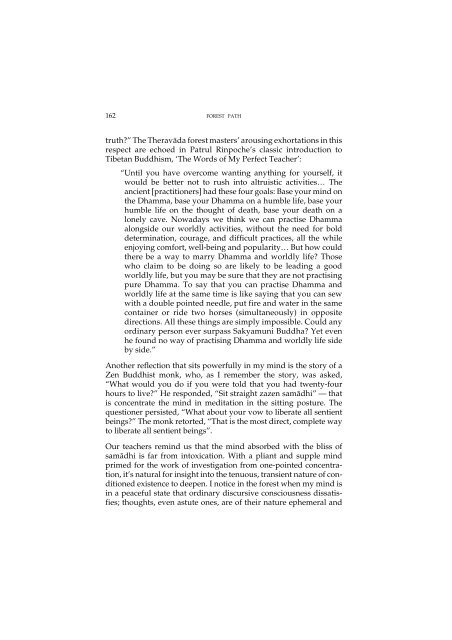Forest Path - Amaravati Buddhist Monastery
Forest Path - Amaravati Buddhist Monastery
Forest Path - Amaravati Buddhist Monastery
Create successful ePaper yourself
Turn your PDF publications into a flip-book with our unique Google optimized e-Paper software.
162 forest path<br />
truth?” The Theravàda forest masters’ arousing exhortations in this<br />
respect are echoed in Patrul Rinpoche’s classic introduction to<br />
Tibetan Buddhism, ‘The Words of My Perfect Teacher’:<br />
“Until you have overcome wanting anything for yourself, it<br />
would be better not to rush into altruistic activities… The<br />
ancient [practitioners] had these four goals: Base your mind on<br />
the Dhamma, base your Dhamma on a humble life, base your<br />
humble life on the thought of death, base your death on a<br />
lonely cave. Nowadays we think we can practise Dhamma<br />
alongside our worldly activities, without the need for bold<br />
determination, courage, and difficult practices, all the while<br />
enjoying comfort, well-being and popularity… But how could<br />
there be a way to marry Dhamma and worldly life? Those<br />
who claim to be doing so are likely to be leading a good<br />
worldly life, but you may be sure that they are not practising<br />
pure Dhamma. To say that you can practise Dhamma and<br />
worldly life at the same time is like saying that you can sew<br />
with a double pointed needle, put fire and water in the same<br />
container or ride two horses (simultaneously) in opposite<br />
directions. All these things are simply impossible. Could any<br />
ordinary person ever surpass Sakyamuni Buddha? Yet even<br />
he found no way of practising Dhamma and worldly life side<br />
by side.”<br />
Another reflection that sits powerfully in my mind is the story of a<br />
Zen <strong>Buddhist</strong> monk, who, as I remember the story, was asked,<br />
“What would you do if you were told that you had twenty-four<br />
hours to live?” He responded, “Sit straight zazen samàdhi” — that<br />
is concentrate the mind in meditation in the sitting posture. The<br />
questioner persisted, “What about your vow to liberate all sentient<br />
beings?” The monk retorted, “That is the most direct, complete way<br />
to liberate all sentient beings”.<br />
Our teachers remind us that the mind absorbed with the bliss of<br />
samàdhi is far from intoxication. With a pliant and supple mind<br />
primed for the work of investigation from one-pointed concentration,<br />
it’s natural for insight into the tenuous, transient nature of conditioned<br />
existence to deepen. I notice in the forest when my mind is<br />
in a peaceful state that ordinary discursive consciousness dissatisfies;<br />
thoughts, even astute ones, are of their nature ephemeral and

















